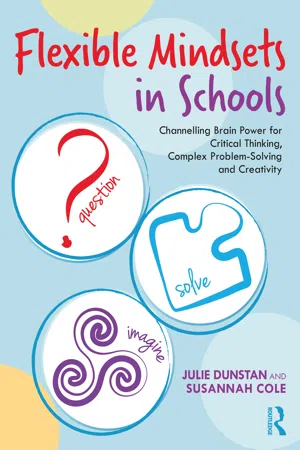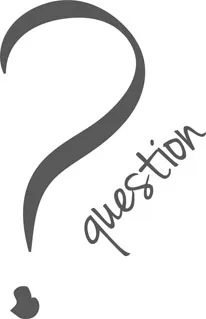
Flexible Mindsets in Schools
Channelling Brain Power for Critical Thinking, Complex Problem-Solving and Creativity
- 174 pages
- English
- ePUB (mobile friendly)
- Available on iOS & Android
Flexible Mindsets in Schools
Channelling Brain Power for Critical Thinking, Complex Problem-Solving and Creativity
About this book
Flexible Mindsets in Schools abandons painstaking evolution in favour of a bold, transformative revolution. It blends research and easily implementable practice to drive solutions that give learners and educators the freedom to become self-directed: to unleash questioning, problem-solving and creativity.
This key text explores how to blend existing and new practices and unlock the potential of student agency as the pathway towards resilience and adaptation. The Flexible Mindsets Model fuses three components that rely on each other to drive self-directed learning: metacognition, "I CAN" mindset messages and executive function processes. This book presents a roadmap for how to create an environment and culture where learners are aware of what works when, feel safe to take learning-related risks, believe that they are capable and have the tools they need to learn.
Flexible Mindsets in Schools will give educators hope that there is a way to revolutionise education to meet the needs of students during these uncertain times by taking small, manageable steps.
Tools to learn more effectively

Saving Books

Keyword Search

Annotating Text

Listen to it instead
Information
SECTION III
Productive Puzzling in action
How do we target the 3C’s?
Criteria for Flexible Mindsets strategies
- can be taught metacognitively to deepen knowledge about ‘What Works When’;
- engage students in Productive Puzzling;
- reflect current evidence from the science of learning;
- can be applied to multiple content areas; and
- can be adapted to apply at different stages of development.
| Ch 6: Critical Thinking | Ch 7: Complex Problem-Solving | Ch 8: Creativity | |
|---|---|---|---|
| | |||
| Keyword | Question | Solve | Imagine |
| Symbol |  |  |  |
| Target Question | Does it make sense? | What else can we try? | What are the possibilities? |
| Tool | Criteria | Shifting Perspectives | Novelty |
| Strategy 1 | is! is Not! | Mix Master | Bending, Breaking or Blending |
| Strategy 2 | Prove it! | Fork in the Road | Diffuse Dreams |
| Strategy 3 | Grapple to Grasp | Mind Reminder | Crazy Connections |
The 3C’s in action
CHAPTER 6
Critical Thinking
Does it make sense?
“Education is not the learning of facts, but training the mind to think.”(Albert Einstein)

- define Critical Thinking as it relates to Flexible Mindsets;
- briefly illustrate how questions help the brain learn;
- describe three strategies for asking and answering the question Does it make sense?;
- share an example of a teacher using Productive Puzzling to engage students in Critical Thinking and reinforce Flexible Mindsets; and
- present items from the Flexible Learning Activation Checklist (FLAC) to track your progress in creating an environment that feeds Critical Thinking.
Flexible Mindsets definition of Critical Thinking
- question from a place of curiosity and be aware that things are not always as they might appear;
- build the habit of noticing juxtapositions, paradoxes, contradictions and other things that don’t make sense;
- be receptive to information that contradicts their opinions and flexible enough to change their minds;
- appreciate the complexity of issues and avoid taking a simplistic view of what is being learned;
- be aware of their own biases, prejudices and self-interests;
- acknowledge that thinking is inherently flawed with mistakes and that thoughts are often irrational;
- be grounded in a strong set of ethics and principles that drive them to question whether or not something is fair or just and to stand up for their beliefs;
- follow the logic of an argument and recognise claims that warrant further evaluation;
- weigh up the pros and cons to make a decision or draw a conclusion; and
- back up a position s...
Table of contents
- Cover Page
- Half Title Page
- Title Page
- Copyright Page
- Contents Page
- About the authors Page
- List of figures Page
- List of tables Page
- Opening: why channel brain power for the 3C’s? Page
- Acknowledgements Page
- Section I. Flexible Mindsets: Where do we begin?
- Section II. Productive Puzzling conditions for transforming mindsets
- Section III. Productive Puzzling in action: How do we target the 3C’s?
- Section IV. Flexible Mindsets for equitable education: How can we use the 3C’s for the benefit of all learners?
- Glossary
- Appendix A: The Flexible Mindsets Spiral of Reflective Learning
- Appendix B: Metacognitive Insights Survey (MIS)
- Appendix C: Flexible Learning Activation Checklist (FLAC)
- Index
Frequently asked questions
- Essential is ideal for learners and professionals who enjoy exploring a wide range of subjects. Access the Essential Library with 800,000+ trusted titles and best-sellers across business, personal growth, and the humanities. Includes unlimited reading time and Standard Read Aloud voice.
- Complete: Perfect for advanced learners and researchers needing full, unrestricted access. Unlock 1.4M+ books across hundreds of subjects, including academic and specialized titles. The Complete Plan also includes advanced features like Premium Read Aloud and Research Assistant.
Please note we cannot support devices running on iOS 13 and Android 7 or earlier. Learn more about using the app